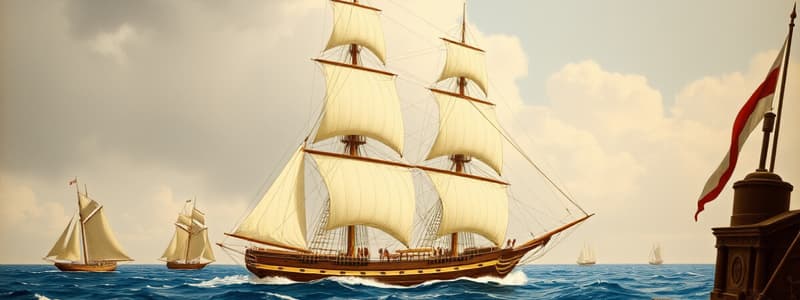Podcast
Questions and Answers
Who wrote the influential work 'The Influence of Sea Power upon History'?
Who wrote the influential work 'The Influence of Sea Power upon History'?
- Theodore Roosevelt
- Captain Alfred T. Mahan (correct)
- John Hay
- William McKinley
What significant statement did 'The Influence of Sea Power upon History' make about world power?
What significant statement did 'The Influence of Sea Power upon History' make about world power?
It stated that world power is determined by who has the best navy.
The United States intervened in the Venezuela-British Guiana Boundary Dispute and ultimately the British took most of the land.
The United States intervened in the Venezuela-British Guiana Boundary Dispute and ultimately the British took most of the land.
True (A)
Who led the Cuban Rebellion in 1895?
Who led the Cuban Rebellion in 1895?
What term describes sensationalist journalism that stirred public opinion regarding Cuba?
What term describes sensationalist journalism that stirred public opinion regarding Cuba?
What was the cause of the explosion of the U.S.S. Maine?
What was the cause of the explosion of the U.S.S. Maine?
What phrase became a rallying cry for going to war with Spain?
What phrase became a rallying cry for going to war with Spain?
The Teller Amendment promised that the U.S. would annex Cuba after the Spanish-American War.
The Teller Amendment promised that the U.S. would annex Cuba after the Spanish-American War.
What was the outcome of the Treaty of Paris in 1898?
What was the outcome of the Treaty of Paris in 1898?
What naval achievement was marked by the Battle of Manila Bay?
What naval achievement was marked by the Battle of Manila Bay?
Who opposed the annexation of Hawaii?
Who opposed the annexation of Hawaii?
What did the Platt Amendment restrict?
What did the Platt Amendment restrict?
What was a key element of TR's foreign policy known as 'The Big Stick'?
What was a key element of TR's foreign policy known as 'The Big Stick'?
What was the purpose of the Open Door Policy?
What was the purpose of the Open Door Policy?
What agreement was made in the Root-Takahira Agreement in 1908?
What agreement was made in the Root-Takahira Agreement in 1908?
Flashcards are hidden until you start studying
Study Notes
Key Figures and Works
- Captain Alfred T. Mahan authored "The Influence of Sea Power upon History" which emphasized naval dominance as key to global power.
- "The Influence of Sea Power upon History, 1890" argued that military power is defined by naval strength rather than ground forces.
Conflicts and Wars
- Venezuela-British Guiana Boundary Dispute involved U.S. intervention against British encroachment on Venezuelan land, but ultimately Britain retained most territory.
- Cuban Rebellion of 1895, led by Jose Marti, prompted U.S. concern due to investments in Cuba and public outrage over Spanish brutality.
- "Yellow journalism" intensified public support for U.S. intervention in Cuba, leveraging emotional appeals to drive sentiment towards war.
- The U.S.S. Maine explosion was inaccurately blamed on Spain, rallying public support with the slogan "Remember the Maine" leading to calls for war.
Major Events and Legislation
- The Spanish-American War in 1898 was sparked by U.S. support for Cuban independence against Spain.
- The Battle of Manila Bay symbolized the end of wooden navies, with the U.S. Steel Navy decisively defeating the Spanish forces.
- Queen Liliuokalani, the last monarch of Hawaii, opposed U.S. annexation, which was achieved following her overthrow by American planters.
Annexations and Treaties
- The Annexation of Hawaii in 1898 aimed at securing a duty-free market for Hawaiian sugar and establishing a naval base.
- The Treaty of Paris (1898) concluded the Spanish-American War, leading to Cuba’s independence, and the cession of Puerto Rico, Guam, and the Philippines to the U.S.
- The Platt Amendment restricted Cuban sovereignty and authorized U.S. intervention, fostering resentment among Cubans.
Territories and Policies
- The Philippines were acquired with the intention to establish a naval base, leading to unrest among Filipinos over U.S. rule.
- Puerto Rico became a self-governing commonwealth in association with the U.S. following its cession in the Treaty of Paris.
- The Anti-Imperialist League formed in response to U.S. expansionist policies, opposing the annexation of the Philippines based on various ideological concerns.
U.S. Strategic Interests
- The Open Door Policy, initiated by John Hay in 1899, aimed to ensure equal trading rights for all nations in China, advocating for unrestricted access.
- Roosevelt's foreign policy, known as "The Big Stick," emphasized diplomatic negotiation backed by military strength.
- The Panama Canal, completed in 1915, strategically shortened travel between the east and west coasts, showcasing U.S. engineering prowess and geopolitical ambition.
Latin American Relations
- The Roosevelt Corollary expanded the Monroe Doctrine by asserting U.S. intervention in Latin American finances to prevent European interference.
- Financial restrictions were imposed on the Dominican Republic in 1905 to ensure U.S. influence in Caribbean trade.
- The Portsmouth Conference (1905) facilitated the end of the Russo-Japanese War, earning Roosevelt a Nobel Peace Prize for his mediation efforts.
U.S.-Japan Relations
- The Gentlemen's Agreement (1908) aimed to limit Japanese immigration to the U.S. while preventing discriminatory laws in California.
- The Root-Takahira Agreement (1908) fostered mutual respect for territories in the Pacific and reaffirmed the Open Door Policy in China.
- The Great White Fleet showcased U.S. naval strength through a worldwide tour, signaling the nation’s military readiness.
Studying That Suits You
Use AI to generate personalized quizzes and flashcards to suit your learning preferences.




